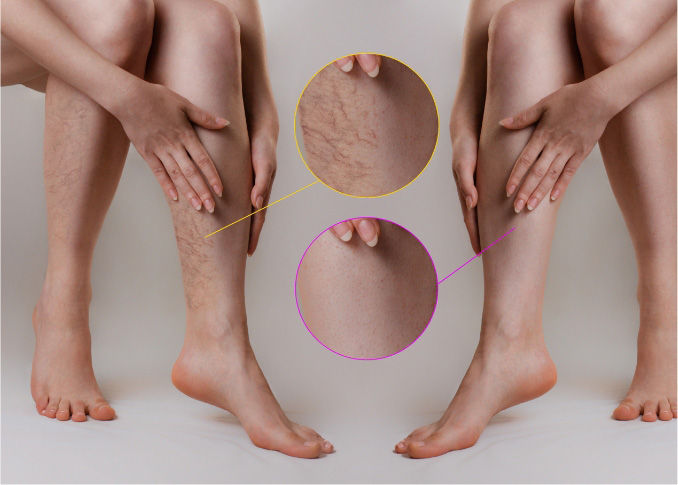What Kind of Doctor Treats Veins?
Vein health often goes unnoticed—until problems begin to affect your daily life. Whether you're dealing with bulging varicose veins, spider veins, or unexplained leg pain, early diagnosis and treatment can prevent complications and restore your comfort. But what kind of doctor treats veins, and how do you choose the right specialist for your condition? The answer lies in understanding the role of vein treatment doctors and how they help manage both cosmetic and medical vein issues.
Why You Shouldn't Ignore Vein Problems
Many people assume vein issues are purely cosmetic. However, untreated vein disease can lead to serious health complications like chronic venous insufficiency, leg ulcers, or blood clots. Symptoms such as leg heaviness, swelling, itching, or burning may seem minor at first, but they often indicate deeper problems in your vascular system.
Seeing a qualified doctor early not only reduces your risk of long-term damage but also opens the door to minimally invasive procedures with quicker recovery times. But again, the question remains—what kind of doctor treats veins effectively?

Understanding the Role of Vein Treatment Doctors
The term "vein treatment doctors" generally refers to physicians who specialize in diagnosing and treating disorders of the venous system. Several types of doctors can fill this role depending on their training and experience. The most common specialists include:
1. Phlebologists
Phlebologists are physicians who focus exclusively on vein diseases. These specialists undergo additional training in venous medicine and are often board-certified by organizations such as the American Board of Venous & Lymphatic Medicine. They are highly experienced in treating varicose veins, spider veins, and more complex vein disorders.
2. Vascular Surgeons
When vein problems are more severe or surgical intervention is required, vascular surgeons step in. These specialists are trained to treat both arteries and veins, making them ideal for complicated cases. However, not all patients need surgery, so vascular surgeons often begin with non-invasive or minimally invasive treatments.
3. Interventional Radiologists
These doctors specialize in image-guided procedures, such as ultrasound-guided sclerotherapy or endovenous laser therapy. If you're looking for high-tech solutions with minimal downtime, interventional radiologists may be the right choice. They often work closely with other vein treatment doctors to ensure comprehensive care.
4. Dermatologists
For surface-level vein issues like spider veins, some dermatologists offer cosmetic treatments such as laser therapy or injections. While they are not vein specialists in the traditional sense, they can still play a role in your vein health journey.
What to Expect During Your First Appointment
Now that you know what kind of doctor treats veins, you might wonder what the first visit involves. Most vein treatment doctors begin with a physical exam and review of your symptoms. They may ask about your family history, lifestyle, and any previous treatments you've tried.
Diagnostic tools such as Doppler ultrasound are commonly used to assess blood flow and pinpoint problem areas. From there, your doctor will recommend a treatment plan tailored to your specific condition. Options may include:
· Compression therapy
· Sclerotherapy
· Endovenous laser ablation (EVLA)
· Radiofrequency ablation (RFA)
· VenaSeal™ closure system
· Surgical vein stripping (for severe cases)
Benefits of Choosing a Vein Specialist
Seeing a dedicated vein specialist offers several advantages:
· Expert diagnosis: Vein doctors can identify the root cause of your symptoms.
· Customized treatment: They tailor solutions based on your unique vein health.
· Advanced technology: Specialists often use minimally invasive tools with quick recovery times.
· Ongoing care: Chronic vein disease requires long-term management, which vein doctors are equipped to provide.

How to Choose the Right Vein Treatment Doctor
With so many options, how do you find the best doctor for your needs? Start by researching local providers who focus on vein treatment. Look for certifications, years of experience, and patient reviews. During your consultation, don’t hesitate to ask questions about the doctor’s approach, success rates, and the technologies they use.
Also, consider whether they provide a full range of services—from cosmetic fixes to medically necessary interventions. A well-rounded clinic ensures you won’t be referred elsewhere for different stages of treatment.
Conclusion:
Understanding what kind of doctor treats veins is the first step in taking control of your vein health. From phlebologists and vascular surgeons to interventional radiologists, vein treatment doctors offer specialized care that can relieve pain, improve appearance, and prevent serious complications.
Don't wait until vein problems interfere with your quality of life. Schedule a consultation today and get the expert help you deserve. Early action could make all the difference in your comfort, confidence, and long-term health.
Comments
Post a Comment